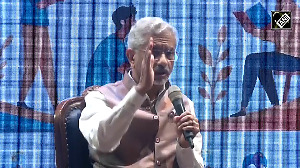Dr Sabeeha Merchant has won the prestigious 2005 Gilbert Morgan Smith Medal awarded by the National Academy of Sciences. Merchant is a professor of biochemistry at the department of chemistry and biochemistry and Molecular Biology Institute of University of California, Los Angeles.
The award, a medal and prize of $20,000, is awarded every three years for excellence in published research on marine or freshwater algae. It was established on a bequest of Helen P Smith in memory of her husband and has been presented since 1979.
Merchant was chosen 'for her pioneering discoveries in the assembly of metalloenzymes and the regulated biogenesis of major complexes of the photosynthetic apparatus in green algae'.
She is one of 15 researchers selected by the NAS to receive its various awards for 2006, 'honoring their outstanding scientific achievements.'
The awards, each of which has a cash component ranging from $10,000 to $25,000, will be presented April 23 at a ceremony in Washington, D C, during the Academy's 143rd annual meeting.
Merchant said the award is recognition for her team. "I should point out that in science, any recognition is not recognition of one person, but rather recognition of a team," she told rediff-India Abroad.
"I have had the good fortune of working with excellent students and post-doctoral fellows from all over the world Australia, Germany, Sweden, France, UK, Taiwan, Korea, Barbados, to name a few places, besides, of course, USA," she said.
"These individuals are like a family. We work together out of enthusiasm for the problem and because we are curious about nature."
Merchant's early education was in Bombay, at the J B Petit High School for Girls."I finished 11th standard (equivalent of O levels) with six subjects as a science student (physics, chemistry, mathematics). My family moved to the US in 1977 because my mother was keen that my brother and I receive education."
The family came to Wisconsin because her father's brother lived in Brookfield (outside Milwaukee). Her parents, Sharifa and Saban Merchant, live in Wisconsin, in Middleton, a Madison suburb.
Merchant completed her BS and PhD from the University of Wisconsin-Madison. She is a post-doctoral scholar from Harvard University and a Searle Scholar.
She is also the recipient of the National Institutes of Health Research Career Development Award, UCLA Faculty Career Development Awards, Guggenheim Foundation Fellowship, Charles Albert Shull Award of ASPB and Herbert Newby McCoy Award.
Merchant said she won the NAS award for her work on trace metal homeostasis in algae. The award recognises her published research on the subject - '...We are designing experiments to determine the underlying mechanism' as to 'how prioritised allocation of an essential resource is accomplished in the context of a nutrient and a cell'.
"In fact, in nature, many organisms are deficient in trace mineral nutrients (like Fe, Zn, Cu) and therefore it is important to understand how cells live and accomplish their metabolic tasks in this situation," she said.
"In countries like India, trace mineral nutrition is a particularly prevalent problem. The Gates Foundation has recognised the importance of mineral nutrition for undernourished individuals (especially children). Even in the western world, mineral nutrition is sub-optimal because of the prevalence on processed food.
Why are these elements important? Everyone knows why iron is important...because it is required for synthesis of heme, which is a 'co-factor' in hemoglobin. Iron deficiency results in anemia," Merchant said.
Likewise zinc, copper and manganese deficiency also result in defects in metabolism because enzymes that catalyse reactions in the body or in an algal cell require these metals for activity. For instance, respiration requires copper because a critical enzyme in respiration, cytochrome oxidase, uses copper. But there are lots of enzymes that use copper."
The National Academy of Sciences is a private, nonprofit honorific society of distinguished scholars engaged in scientific and engineering research, dedicated to the furtherance of science and technology and to their use for the general welfare.
Since 1863, the NAS has served to 'investigate, examine, experiment, and report upon any subject of science or art' whenever called upon to do so by any department of the United States government.






 © 2025
© 2025